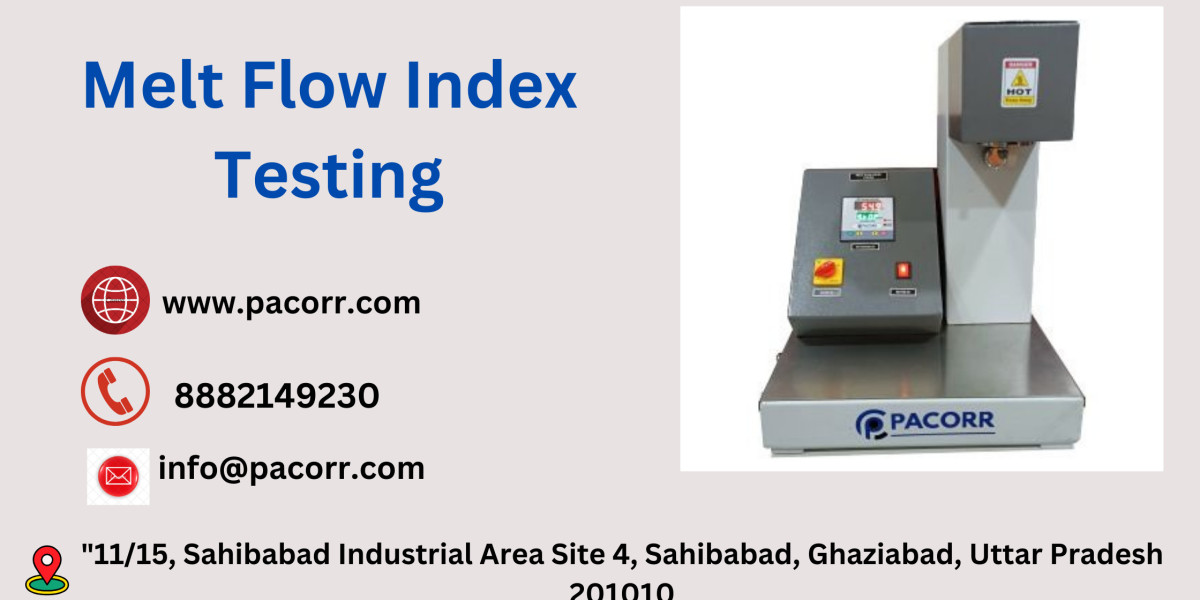Introduction to Melt Flow Index Tester
In the world of polymer and plastic manufacturing, quality control is paramount. One critical aspect of this process is measuring the flow properties of the materials used. The Melt Flow Index (MFI) Tester is an essential instrument that provides this crucial data, ensuring manufacturers produce high-quality, consistent products. This article delves into the importance, working principle, applications, and benefits of the Melt Flow Index Tester.
What is a Melt Flow Index Tester?
The Melt Flow Index Testing, often referred to as MFI Tester, is a specialized instrument used to determine the melt flow rate of thermoplastic polymers. It measures the rate at which a polymer melts and flows under a specific temperature and pressure. This measurement is critical for understanding the material’s viscosity and, consequently, its processing behavior and performance in end-use applications.
Importance of Melt Flow Index Testing
Quality Control
Ensuring consistent product quality is a top priority for manufacturers. The MFI Tester helps in maintaining this consistency by providing reliable data on the flow properties of polymers. Variations in melt flow Test can indicate differences in molecular weight distribution, which can affect the material's mechanical properties and processability.
Material Selection
Engineers and product designers rely on MFI data to select the appropriate materials for specific applications. Different applications require materials with varying flow properties. For instance, high-flow materials are ideal for injection molding, while lower flow rates may be better suited for extrusion processes.
Regulatory Compliance
Many industries, such as automotive, aerospace, and medical devices, have stringent regulations regarding material properties. The MFI Tester helps manufacturers comply with these regulations by providing accurate data on the melt flow characteristics of their materials.
How Does the Melt Flow Index Tester Work?
The Melt Flow Index Tester operates by heating a polymer sample to a specified temperature, causing it to melt. The melted polymer is then extruded through a die under a specific load. The rate at which the polymer extrudes is measured and expressed as the melt flow rate, typically in grams per 10 minutes.
Key Components
- Heated Barrel: Maintains the polymer at the required temperature.
- Piston and Load: Applies pressure to the molten polymer.
- Die: A standard-sized opening through which the polymer flows.
- Timer and Scale: Measures the amount of extruded polymer over a specified time.
Testing Procedure
- Sample Preparation: A small amount of polymer is prepared and placed into the heated barrel.
- Heating: The polymer is heated to the specified temperature.
- Loading: A piston applies pressure to the molten polymer.
- Extrusion: The polymer flows through the die, and the extruded material is collected.
- Measurement: The mass of the extruded polymer is measured, and the melt flow rate is calculated.
Applications of Melt Flow Index Tester
Polymer Manufacturing
In polymer manufacturing, MFI testing is used to monitor and control the production process. It ensures that the produced polymers meet the desired specifications and performance criteria.
Quality Assurance
Manufacturers use MFI testing as part of their quality assurance processes. It helps in identifying any inconsistencies or deviations in the material properties, allowing for corrective actions to be taken.
Research and Development
In R&D, the MFI Tester is used to develop new materials with specific flow properties. It aids in understanding the behavior of different polymer formulations under various conditions.
Regulatory Testing
Industries with stringent regulatory requirements use MFI testing to certify that their materials meet the necessary standards. This is particularly important in sectors like automotive, aerospace, and healthcare.
Benefits of Using Melt Flow Index Tester
Precision and Accuracy
The MFI Tester provides precise and accurate measurements of the melt flow rate, ensuring reliable data for quality control and material selection.
Efficiency
MFI testing is a relatively quick and efficient process, providing valuable information about the polymer’s properties in a short amount of time.
Cost-Effective
By identifying material inconsistencies early in the production process, MFI testing helps prevent costly manufacturing errors and material waste.
Compliance
The MFI Tester ensures that materials comply with industry standards and regulations, which is crucial for industries with stringent quality requirements.
Conclusion
The Melt Flow Index Tester is an indispensable tool in the polymer and plastic manufacturing industries. It provides critical data on the flow properties of materials, aiding in quality control, material selection, regulatory compliance, and research and development. By understanding and utilizing the capabilities of the MFI Tester, manufacturers can ensure the production of high-quality, consistent, and compliant products.








